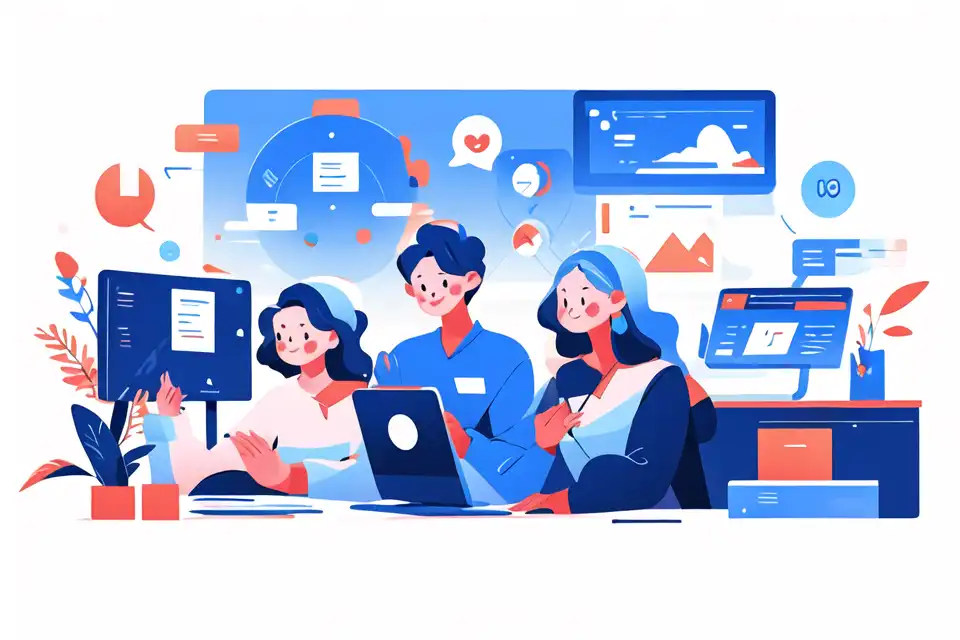Workplace AI Solutions
Learn about the top tips and strategies in workplace AI solutions.
Try Lark for Free
In the dynamic landscape of the corporate world, businesses are persistently seeking novel and innovative means to gain a competitive edge, streamline operations, and enhance productivity. One of the most transformative tools at their disposal today is Artificial Intelligence (AI). AI solutions are rapidly making their way into workplaces, demonstrating the potential to revolutionize business operations. This exploration promises to shed light on the immense possibilities, real-world applications, and future trends of workplace AI solutions, while offering valuable insights for successful implementation.
"Unlock the power of Lark to elevate your business operations."
Understanding workplace ai solutions
Defining Workplace AI Solutions
Workplace AI solutions refer to the application of AI technologies such as machine learning, natural language processing, and predictive analytics to automate and optimize various business operations. These solutions may range from intelligent virtual assistants helping with scheduling tasks to advanced data analytics tools offering actionable insights for strategic decision-making.
The Significance of Workplace AI Solutions
The advent of AI in workplaces is not just a passing fad. According to a study by McKinsey Global Institute, AI could add approximately $13 trillion to the global economy by 2030. The same report also predicts that businesses that fully absorb AI could double their cash flow by 2030. This underlines the importance and potential of AI in driving growth and profitability.
The transformative role of workplace ai solutions
Boosting Productivity and Innovation
AI has the power to automate repetitive tasks, freeing up human resources to focus more on strategic and creative aspects of their roles. For instance, AI-powered chatbots can handle customer queries efficiently, allowing the customer service team to focus more on complex issues. This not only enhances productivity but also fosters innovation.
A Win-Win for Organizations and Employees
In addition to operational efficiency, AI can also lead to improved job satisfaction. When employees are relieved of mundane tasks, they can focus on more engaging and meaningful work, leading to increased job satisfaction and retention. On the other hand, businesses gain a competitive edge through improved efficiency and productivity.
Learn more about Lark can help you with everything mentioned in the article.
Strategies for implementing workplace ai solutions
Integration Steps for Workplace AI Solutions
Implementing AI in the workplace is a multi-step process that begins with identifying the areas that could benefit from automation and optimization. The next step involves selecting the appropriate AI tools, followed by customizing them according to specific business needs and integrating them into existing workflows.
Best Practices for Workplace AI Solutions Adoption
Successful AI adoption requires a strategic approach, which includes promoting a culture of digital literacy, continuous learning, and change management. Regular training programs can help employees understand and leverage AI tools effectively. Moreover, it's crucial to track the performance and impact of AI solutions regularly for continuous improvement.
Technological aspects of workplace ai solutions
Tools and Platforms for Workplace AI Solutions
There are numerous AI tools and platforms available today, each with its unique features and applications. These may include data analytics tools, machine learning platforms, AI-powered chatbots, and virtual assistants, among others.
Integrating AI into Existing Business Systems
Integrating AI into existing business systems requires a careful assessment of the organization's infrastructure, workflows, and resources. It's crucial to choose AI solutions that can seamlessly fit into the existing ecosystem without disrupting operations.
Learn more about Lark can help you with everything mentioned in the article.
Real-world applications: case studies in workplace ai solutions
Successful implementations of workplace ai solutions
Successful implementations of workplace ai solutions
There are numerous examples of organizations that have effectively leveraged AI to enhance their operations. For instance, a global retail giant used AI to optimize its supply chain and logistics, reducing operational costs and improving customer satisfaction.
Key takeaways from successful ai implementations
Key takeaways from successful ai implementations
The key takeaway from these case studies is that successful AI implementation requires a strategic approach, continuous learning, and a willingness to adapt and evolve.
Overcoming challenges in workplace ai solutions
Common Obstacles and Risks
Despite its numerous benefits, AI adoption comes with its share of challenges, including data privacy concerns, potential job displacement, and resistance to change.
Mitigation Strategies
These challenges can be mitigated with a well-thought-out AI strategy, robust data governance framework, and efforts to foster a culture of continuous learning and change.
Learn more about Lark can help you with everything mentioned in the article.
Future trends in workplace ai solutions
Emerging Applications of AI in Various Industries
AI has the potential to transform various sectors, from healthcare, where it can aid in diagnosis and treatment, to finance, where it can streamline transactions and detect fraud.
Preparing for Future Developments in Workplace AI Solutions
To stay ahead of the curve, organizations need to keep an eye on AI advancements, continuously invest in training their workforce, and be ready to adapt their business models and strategies.
Conclusion
Workplace AI solutions have the potential to revolutionize business operations, boost productivity, and foster innovation. As we move towards a more AI-driven future, it's crucial for businesses to embrace this technology and leverage it for growth and success.
Learn more about Lark can help you with everything mentioned in the article.
Frequently asked questions (faqs)
What is workplace AI?
Workplace AI refers to the application of AI technologies in a business environment to automate and optimize various operations.
Why is AI important in the workplace?
AI can enhance productivity, streamline operations, and drive innovation in the workplace, giving businesses a competitive edge.
What are the potential risks of AI in the workplace?
Potential risks include data privacy concerns, job displacement, and resistance to change.
How can businesses successfully implement AI solutions?
Successful implementation requires a strategic approach, continuous learning, and a culture of change management.
How can employees prepare for an AI-driven workplace?
Employees can prepare by enhancing their digital literacy, participating in relevant training programs, and being open to change.
Do's and don'ts: navigating workplace ai solutions
| Do's | Don'ts |
|---|---|
| Do invest in employee training | Don't implement AI without a strategy |
| Do assess the impact of AI regularly | Don't underestimate the importance of data privacy |
| Do foster a culture of digital literacy | Don't ignore potential resistance to change |
| Do choose AI tools that fit your needs | Don't expect instant results |
In conclusion, embracing AI in the workplace is more than just adopting a new technology; it's about preparing for the future of work. By understanding the potential of AI, implementing it strategically, and overcoming the challenges that come along, businesses can unlock a new level of growth and success.
"Unlock the power of Lark to elevate your business operations."








